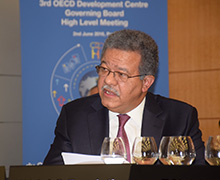news
Leonel Fernández: Global Crisis Continues to Buffet Latin America’s Economies
June 3, 2016
This Thursday President of Global Foundation for Democracy and Development (GFDD) and Fundación Global Democracia y Desarrollo (Funglode) Dr. Leonel Fernández stated that the global economic crisis continues to negatively impact the economies of most Latin American and Caribbean countries, causing a significant reduction in investment, job growth, and state revenues.
Former Dominican Republic President Fernández’s statements came during a speech
at the 3rd High-Level Meeting at the Organisation for Economic Cooperation and Development’s (OECD’s) Development Centre, where he appeared in his capacity as European Union–Latin America and Caribbean (EU-LAC) Foundation president. The event was part of the program of Latin America and Caribbean Week, taking place this week in France.
Elaborating on the subject of the economy, the former Dominican Head of State noted that following a period of remarkable growth, in recent years the Latin America and Caribbean region has in general experienced a significant decline, seen in sharp relief in countries like Brazil and Venezuela, where the situation has generated enormous political tension and social protests.
Citing figures from the Economic Commission
for Latin America and the Caribbean (ECLAC), the Dominican politician noted that in 2015 the region’s economies shrank some 0.4%, their worst showing since 2009.
In South America in general, Fernández continued, economic growth dropped from 7.0% to 0.5% between 2010 and 2015, damaging vital areas such as new investments, public revenues, and employment.
In the case of Brazil, the Dominican intellectual highlighted the current impeachment
process underway against the nation’s president, which has sparked worries about its democratic credibility, the responsibility of its politicians, and the reliability of its entire political system.
With regards to the countries of Central America, Fernández stated that regional growth continued at a rate of 4.4%, while the English- and Dutch-speaking Caribbean countries were managing growth of 1.0%.
He highlighted that the Dominican Republic
has remained the exception, registering growth last year of 7%, according to figures from its Central Bank, well above the regional average.
In terms of the future, the former president underlined that the resumption of diplomatic relations between Cuba and the United States, the peace talks between the Colombian government and the FARC (Revolutionary Armed Forces of Colombia), and the continuation of the Panama Canal expansion are all positive signs for the Latin America
region.
On Friday, Fernández is set to appear at the 8th International Economic Forum on Latin America and the Caribbean, which aims to redefine partnerships to support inclusive and lasting growth.







